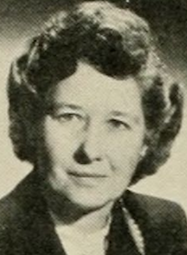Lucile Hoerr Charles
Lucile Marie Hoerr Charles (August 13, 1903 – March 7, 1965) was an American college professor, theatre professional, and folklorist. She was the first director of dramatic arts at East Carolina University. Her scholarship focused on clowns, and on drama as an aspect of naming and other rituals. Later in life, she wrote about her own medical issues, and promoted a slower, gentler way to remove adhesive bandages.
Early life and education[edit]
Hoerr was born in Chicago, the daughter of Charles Ferdinand Hoerr and Lillie Anna Sophia Obermann Hoerr. Her younger brother Stanley became a prominent surgeon.[1] She studied piano as a girl, and graduated from the University of Chicago in 1930, where she wrote for the Daily Maroon.[2] She earned master's degrees from Columbia University in 1941, and Yale University in 1942. She completed her Ph.D. in educational psychology at Yale in 1943. From 1955 to 1957, she held a Bollingen Foundation fellowship for further study at the C. G. Jung Institute in Zürich.[3]
Hoerr began using her father's first name, Charles, as her surname in adulthood.[3]
Career[edit]
Charles worked at Lenox Hill Neighborhood House in New York City from 1930 to 1934,[4] and taught at the American Peoples College in Europe from 1934 to 1936.[5][6] She worked in the drama and speech department at Teachers College, Columbia University from 1937 to 1939. She also produced a radio drama series, The Land of Plenty, while she was based in New York City,[3] and appeared in a Broadway show, Life Begins (1933).[4]
Charles was on the faculty of Mary Washington College from 1943 to 1946, then became a professor of English at East Carolina University.[7] She became a full professor in 1959. As the school's first director of dramatic arts,[8] she directed three major plays per term and weekly one-act plays, and produced radio shows. She founded the Eastern Regional Play Festival, held on campus and welcoming theatre professionals from throughout the region.[3] She also directed an annual children's play at East Carolina Playhouse.[9]
Publications[edit]
- "Snaring the Elusive Broadway Job" (1930)[10]
- "So You're Going on the Stage" (1931)[11]
- "And for a Backdrop the Tyrolean Alps!" (1935)[6]
- "The Clown's Function" (1945)[12]
- "Growing up Through Drama" (1946)[13][14]
- "Regeneration Through Drama at Death" (1948)[15]
- "Drama in First-Naming Ceremonies" (1951)[16]
- "Drama in Shaman Exorcism" (1953)[17]
- "Drama in War" (1955)[18]
- The Story of the Baby Sphinx and Other Fables (1959)[19]
- "Removing the Patient from the Tape" (1960)[20]
- "How to avoid pain in removing adhesive tape" (1961)[21]
- "Morale in Recovering from Guillain-Barré Disease: Account of an Ex-patient" (1961)[22]
Personal life[edit]
Charles was public about her experiences with Guillain-Barré disease. She died in 1965, at the age of 61, at the Cleveland Clinic, where her brother was a surgeon.[9] Her papers are in the manuscript collection of East Carolina University.[8][23]
References[edit]
- ^ "Stanley O. Hoerr, MD (1909–1990)" Cleveland Clinic Journal of Medicine (September 1990): 527-528.
- ^ "Comment and Opinion: Oh, Pshaw, Lucile!". The Muscatine Journal. 1923-11-19. p. 3. Retrieved 2024-03-13 – via Newspapers.com.
- ^ a b c d Rives, Ralph Hardee (1979). "Charles, Lucile Marie Hoerr". NCpedia. Retrieved 2024-03-13.
- ^ a b "Dramatic Expert Coming; Miss Lucile H. Charles Will Address Unity Club". The Ridgewood Herald. 1934-05-25. p. 18. Retrieved 2024-03-13 – via Newspapers.com.
- ^ "The American Peoples College in Europe". School and Society. 39 (1000): 237–238. February 24, 1934 – via Internet Archive.
- ^ a b Charles, Lucile Hoerr (February 1935). "And for a Backdrop, the Tyrolean Alps!". The Playground. 28 (11): 541–543 – via Internet Archive.
- ^ East Carolina University, The Tecoan (1951 yearbook): 16.
- ^ a b "The Story Lives". The News and Observer. 1970-03-15. p. 72. Retrieved 2024-03-13 – via Newspapers.com.
- ^ a b "ECC Professor Dies in Cleveland, Ohio". The News and Observer. 1965-03-09. p. 8. Retrieved 2024-03-13 – via Newspapers.com.
- ^ Charles, Lucile Hoerr (October 5, 1930). "Snaring the Elusive Broadway Job". The New York Times. pp. 155, 156. Retrieved 2024-03-13.
- ^ Charles, Lucile Hoerr. "So You're Going on the Stage" Theatre Magazine (January 1931).
- ^ Charles, Lucile Hoerr (1945). "The Clown's Function". The Journal of American Folklore. 58 (227): 25–34. doi:10.2307/535333. ISSN 0021-8715. JSTOR 535333.
- ^ Charles, Lucile Hoerr (1946). "Growing up Through Drama". The Journal of American Folklore. 59 (233): 247–262. doi:10.2307/536248. ISSN 0021-8715. JSTOR 536248.
- ^ "Article Published". News and Record. 1946-10-10. p. 10. Retrieved 2024-03-13.
- ^ Charles, Lucile Hoerr (1948). "Regeneration Through Drama at Death". The Journal of American Folklore. 61 (240): 151–174. doi:10.2307/536125. ISSN 0021-8715. JSTOR 536125.
- ^ Charles, Lucile Hoerr (1951). "Drama in First-Naming Ceremonies". The Journal of American Folklore. 64 (251): 11–35. doi:10.2307/536100. ISSN 0021-8715. JSTOR 536100.
- ^ Charles, Lucile Hoerr (1953). "Drama in Shaman Exorcism". The Journal of American Folklore. 66 (260): 95–122. doi:10.2307/537324. ISSN 0021-8715. JSTOR 537324.
- ^ Charles, Lucile Hoerr (July–September 1955). "Drama in War". Journal of American Folklore. 68 (269): 253–281. doi:10.2307/536903. JSTOR 536903 – via Internet Archive.
- ^ Charles, Lucile Marie Hoerr (1959). The Story of the Baby Sphinx and Other Fables.
- ^ Charles, Lucile Hoerr (May 1960). "Removing the Patient from the Tape". RN. 23 (5): 53 – via Internet Archive.
- ^ Hoerr, Lucile Charles (September 1961). "how to avoid pain in removing adhesive tape". Anesthesia & Analgesia. 40 (5): 589. doi:10.1213/00000539-196109000-00026. ISSN 0003-2999.
- ^ Charles, Lucile Marie Hoerr. "Morale in Recovering from Guillain-Barré Disease: Account of an Ex-patient" Psychosomatic Medicine 23(4)(July 1961): 298-303.
- ^ Lucile Marie Hoerr Charles Papers (#105), East Carolina Manuscript Collection, J. Y. Joyner Library, East Carolina University, Greenville, North Carolina.

